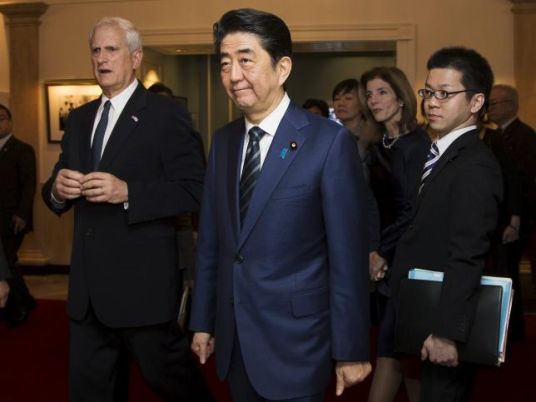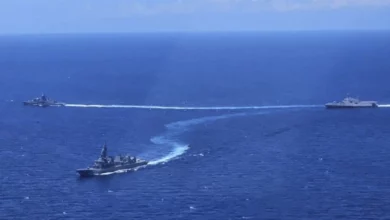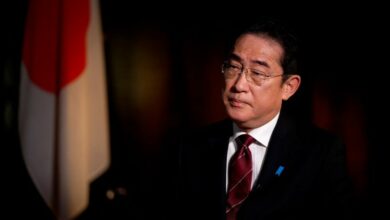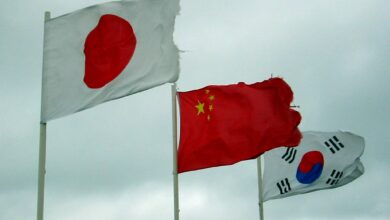
Japan and the United States unveiled new guidelines for defense cooperation on Monday, reflecting Japan's willingness to take on a more robust international role at a time of growing Chinese power and rising concerns about nuclear-armed North Korea.
The first revision to the guidelines since 1997 allows for global cooperation militarily, ranging from defense against ballistic missile, cyber and space attacks and maritime security, following a Japanese Cabinet resolution last year reinterpreting Japan's pacifist constitution to allow the exercise of the right to "collective self-defense."
The guidelines reflect a changing world and mean Japan could shoot down missiles heading toward the United States and come to the aid of third countries under attack.
A centerpiece of Japanese Prime Minister Shinzo Abe’s US visit this week, the guidelines are part of Abe's wider signal that Japan is ready to take more responsibility for its security as China modernizes its military and flexes its muscles in Asia.
In return, the conservative Japanese leader, who is scheduled to meet US President Barack Obama on Tuesday, has been seeking fresh assurances that America comes to Japan's aid if necessary in a clash with China.
A joint statement issued after the meeting "reconfirmed the alliance's commitment to the security of Japan," as well as Japan's sovereignty over islets in the East China Sea known as the Senkakus in Japan and the Diaoyus in China, the subject of a bitter territorial dispute.
The surge in China's military spending since 1997, when the last US-Japan defense cooperation guidelines were issued, and its more assertive stance in maritime and territorial disputes has uneased both Japan and US allies in Southeast Asia.
Announced after a meeting of the US and Japanese foreign and defense ministers in New York, the guidelines eliminate geographic restrictions that had largely limited joint work to the defense of Japan and the surrounding area, a senior US official said.
"We will be able to do globally what we’ve been able to do in the defense of Japan and regionally," the official said, saying the new guidelines also meant Japan "can respond to attacks on third countries; not just the United States."
Missile defense
The changes would allow greater coordination and information sharing, for example, in missile defense, and allow Japan to shoot down any missiles heading for US territory or to defend US ships engaged in missile-defense in the vicinity of Japan, he said.
They would also allow increased cooperation in cybersecurity and defense of assets in space, the US official said.
Asked if the updated guidelines were a response to China’s growing power and assertiveness, the official said they would strengthen the US alliance system at an important time and reflected Asia’s growing importance, but repeated the US mantra that such moves were "not aimed at any single country."
Despite US assurances of its military commitment, worries persist in Tokyo that one day Washington, which is reining in its defense spending and is deeply intertwined economically with China, may not come to Japan's defense, for example in a clash with Beijing over the disputed East China Sea territory.
Patrol ships and military aircraft from both countries have routinely shadowed each other near the tiny islands since then, raising fears that an unintended collision or other incident could develop into a larger clash.
Obama has said the Japanese-controlled isles are covered by a bilateral security treaty obliging the United States to defend Japan, but Washington has also made clear it does not want to get dragged into a Sino-Japanese conflict.
The revisions to the guidelines reflect a profound evolution in Japanese security policy.
In the most dramatic shift since Japan's military was rebuilt after World War Two, Abe's Cabinet in July reinterpreted the constitution's pacifist Article 9 to allow Japan's armed forces to provide military aid to the United States and other friendly countries under attack.
The shift, to be enabled by legislation later this year, will allow Japan's military to take actions such as mine-sweeping during hostilities in the Hormuz Strait in the Gulf. It will also allow logistical support for US forces in conflicts beyond Japan's immediate neighborhood without a specific law for each operation, Japanese lawmakers and government sources said.
A key Liberal Democratic Party lawmaker said Abe's ruling LDP party wants to revise Japan's constitution by late 2018 to remove constraints on his defense strategy and avoid time-consuming legal gymnastics over the interpretation of the current charter.




